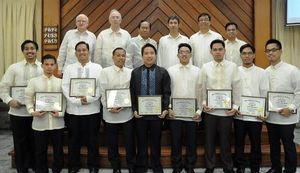When a young pastor named Rey married, he and his wife settled in a small village on the island of Panay in the Philippines. He had trained for the ministry and later embraced the doctrines of God’s sovereign grace.
His mother-in-law donated a piece of ground for a church building and they were able to build a small meeting place of bamboo and leaves with a metal roof. However, their chapel overlooks the sea and the roof soon had corrosion holes in it.
They have begun to build a concrete structure which will be more lasting, but they have no money. In fact Rey has little income from the small church – where about 20 meet each Lord’s Day – and has to look elsewhere for finances to support this pioneer church-planting work.
Good books
Larry is also a young pastor. He is only 32 but already has seven children. He had been pastoring a Pentecostal congregation for the past three years, but while attending the Cubao Reformed Baptist Church Pastors’ Conference he heard teaching from the Word of God which gripped him.
He went home to his small town on the island of Marinduque with good books from the Banner of Truth and Evangelical Press. These he read avidly. They have changed his whole understanding of the Word of God; so much so that he has now resigned from the Pentecostal Church as he can no longer teach their doctrines.
They only paid him about £10 a week but he was able to support his large family by farming some family land. Now, of course, he has lost the £10 he formerly received. He wants to plant a Reformed church in his home town as there is no such ministry on the whole island.
Pioneering works
Here is the dilemma. Where is the money to come from to support these pioneering works by men who are coming to the Reformed faith and desire to see churches established according to the Word of God?
Certainly, the already established churches must help support such works. However, in the Philippines (as in other lands) the established churches are themselves often small and new. They struggle to support their own pastor and workers, and have little if anything left over for missions, although they desire to help.
What, then, about churches in the West that have long been established and, comparatively speaking, have much more money? There is of course the danger that churches in third world countries can become dependent on foreign funds and never realise that it is their responsibility to support their own pastors and witness.
Keeping the balance
How can we keep a right balance between these extremes of poverty and dependence? Many schemes have been tried. Support for a number of years on a gradually reducing scale seems to be the best scheme. But each town and each village is different, so the period of support will vary from one situation to another.
Some works are much more quickly established by the grace of God than others, where the ground is harder yet a church may be emerging. What happens to the believers if they are abandoned?
Yes, this is a perennial problem which we are experiencing in the Philippines – how to take advantage of the many opportunities to start Reformed churches. We are now training men for such ministry and they are willing to struggle to see churches planted.
But how shall we put food on their tables and a roof over their heads? How can we give them the tools they need to establish churches to the glory of God?
The Cubao Reformed Baptist Church – which is one of the largest churches and is fully self-sufficient – has established a missions fund which is already helping six men. It is mainly financed with foreign funds although there is also some local money.
Brian Ellis


















